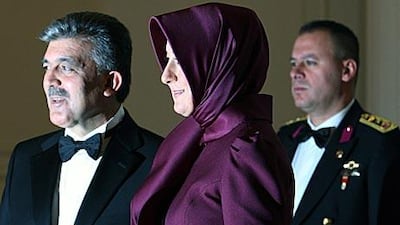ISTANBUL // In a gesture that gives momentum to ending the ban on the hijab in Turkey's public sphere, the president's wife wore a headscarf to an official Republic Day banquet on Friday.
Hayrunnisa Gul attended the reception marking the founding of modern Turkey by Mustafa Kemal Ataturk, whose secular principles are revered by the nation's traditional establishment.
The military - which sees itself as the guardian of Ataturk's vision - boycotted the event and held its own reception, a decision that reflects the divide between the Islamist-leaning government and opponents who fear secular ideals are in peril.
Abdullah Gul, the country's president, has decided to raise his wife's profile. Mrs Gul, who wears the veil, made headlines by appearing at the official welcome ceremony during a state visit by Christian Wulff, the German president, in Ankara on October 19. For the first time since her husband was elected president three years ago, Mrs Gul, her hair covered by a white and silver headscarf, walked the red carpet in front of the honour guard made up by soldiers of the secular armed forces.
"That was very good timing," Fatma Barbarosoglu, a sociologist and newspaper commentator who wears a headscarf herself, wrote in an e-mail response to questions last week. An end to the headscarf debate would free energies to tackle more pressing problems facing the country, Barbarosoglu wrote.
In Turkey, a secular parliamentary republic and EU candidate country with a predominantly Muslim population, the headscarf has been one of the most controversial domestic issues for years.
Turkish secularists regard the headscarf as a symbol of political Islam that should be kept out of public institutions. Many of them abhor the fact that the country's first lady wears one.
But with two out of three women in Turkey covering their hair, Mr Gul and the religiously conservative government say the time has come for secularists to accept that many women in Turkey wish to assert their religious identity.
"He said: 'Enough now'," Ahmet Sever, a top adviser to Mr Gul, said about the president in an interview published by the Turkish daily Milliyet last week. "Whether you like it or not, there are people with different lifestyles in this country."
In recent years, Mrs Gul had kept away from the red carpet and greeted state visitors only at the presidential palace. Now her husband has decided to change that.
Mrs Gul's appearance came three weeks after a decision by Turkey's board of higher education effectively lifted the ban on the headscarf for students at universities. The board told teachers they were no longer allowed to exclude headscarved students from classes. While many universities have started to admit headscarved students since then, efforts to find a political consensus in Ankara to put the change on a solid legal footing have proved difficult.
Mr Erdogan's ruling Justice and Development Party, or AKP, held meetings with other parties but failed to reach an agreement. The Republican People's Party, or CHP, the main secularist opposition party, accused the AKP of following a secret agenda to use the end of the headscarf ban for students as an argument to allow headscarves for younger pupils in schools and for public servants as well.
The AKP denied the accusations, but Mr Erdogan told his party in a speech last week the search for a consensus would be dropped for now and taken up again after parliamentary elections scheduled for June. Polls say the AKP can expect to win the elections.
But even without a political agreement to officially lift the headscarf ban at universities, acceptance of the veil in Turkey's public life is growing.
One reason is that the CHP, as the main political representative of secularists, has said it is no longer opposed to headscarves in universities. Kemal Kilicdaroglu, the CHP leader, also rejected calls from within his party to boycott Mr Gul's national day reception on Friday night.
Barbarosoglu, the sociologist, also welcomed a statement by Mr Kilicdaroglu in which he said it was not the question of secularism but social issues that represented the most pressing challenge. A change of focus away from the debate about secularism is overdue, she wrote. "For years, the headscarf problem has prevented many issues from being seen and being discussed."
* With additional reporting by the Associated Press

